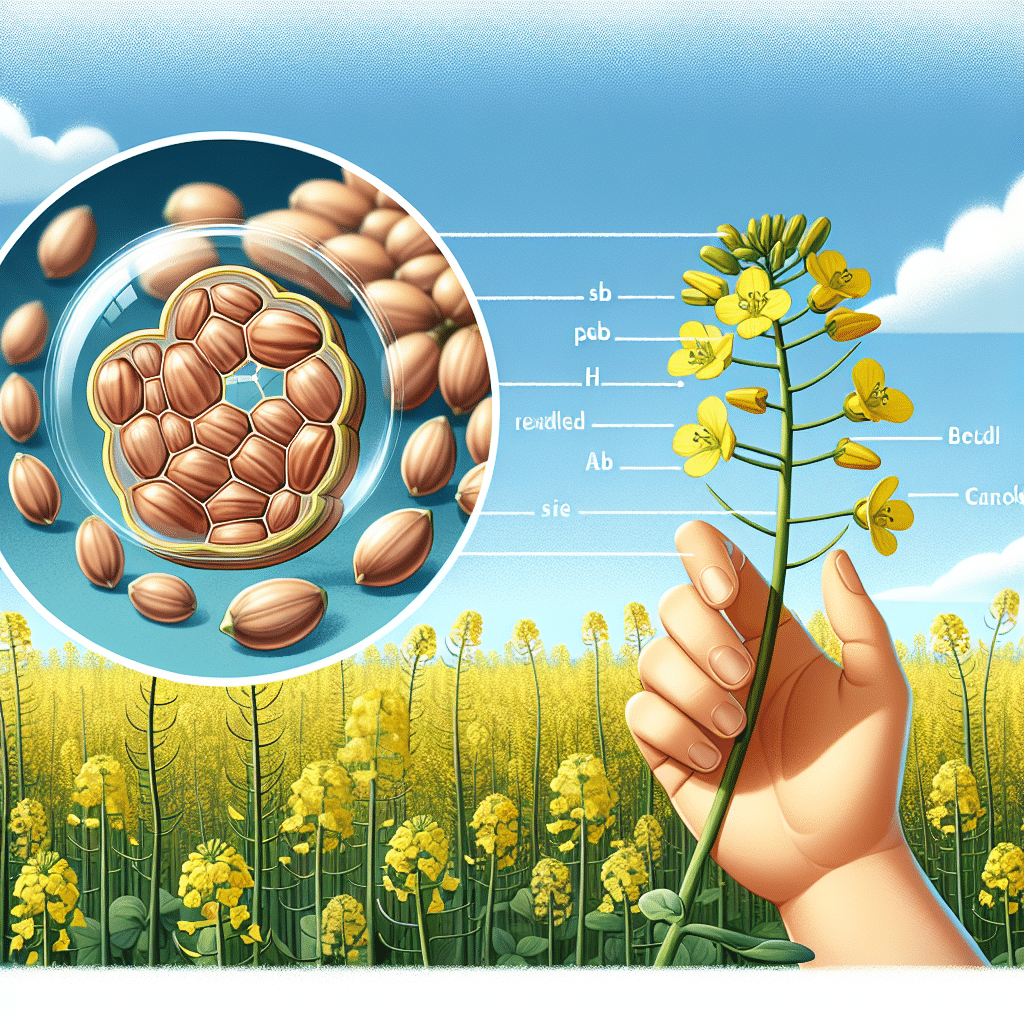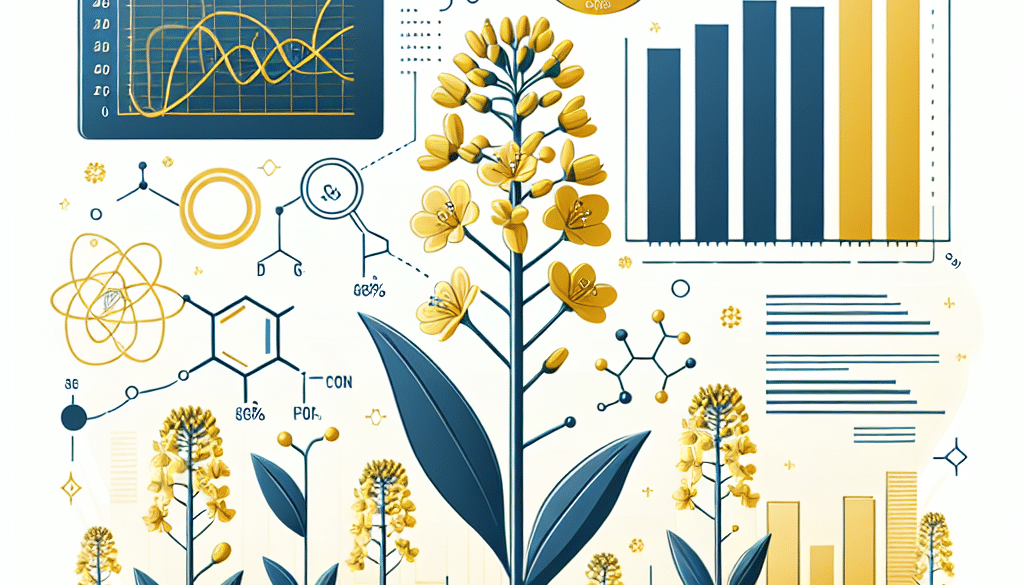What Is Canola Protein?
-
Table of Contents
- Canola Protein: The Emerging Plant-Based Powerhouse
- Understanding Canola Protein
- Nutritional Profile of Canola Protein
- Health Benefits of Canola Protein
- Applications of Canola Protein
- Environmental Impact and Sustainability
- Case Studies and Research
- Market Trends and Future Outlook
- Conclusion: Embracing Canola Protein
- Discover ETprotein’s High-Quality Canola Protein Products
Canola Protein: The Emerging Plant-Based Powerhouse

As the world increasingly leans towards plant-based nutrition, canola protein is emerging as a promising new player in the field of alternative proteins. Derived from the seeds of the canola plant, this protein source is gaining attention for its nutritional benefits and versatility. In this article, we delve into what canola protein is, its nutritional profile, benefits, applications, and why it might be the next big thing in the plant-based revolution.
Understanding Canola Protein
Canola protein is extracted from the seeds of the canola plant, which is also known for producing canola oil. The canola plant, originally bred from the rapeseed plant, has been modified to contain lower levels of erucic acid and glucosinolates, making it safe for human consumption. The protein is obtained by crushing the seeds and using various processes to separate the protein from the oil and other components.
Nutritional Profile of Canola Protein
Canola protein stands out for its impressive nutritional profile. It is a complete protein, meaning it contains all nine essential amino acids required by the human body. Here’s a closer look at its nutritional benefits:
- High Protein Content: Canola protein typically contains about 40% protein, which is comparable to other plant-based proteins like soy and pea.
- Essential Amino Acids: It includes a balanced mix of amino acids, including a high level of sulfur-containing amino acids like methionine and cysteine.
- Low in Antinutrients: Canola protein has lower levels of antinutrients compared to other plant proteins, which can interfere with the absorption of nutrients.
- Rich in Nutrients: It is also a good source of vitamins and minerals, including vitamin E, potassium, and magnesium.
Health Benefits of Canola Protein
Canola protein offers several health benefits that make it an attractive option for those looking to improve their diet:
- Heart Health: The balance of amino acids and the presence of unsaturated fats in canola protein may contribute to cardiovascular health.
- Weight Management: High-protein diets are known to promote satiety and can aid in weight management, and canola protein can be a valuable component of such diets.
- Muscle Maintenance: As a complete protein, it supports muscle growth and maintenance, which is crucial for athletes and the elderly.
- Plant-Based Diet Support: For vegans and vegetarians, canola protein provides a non-animal source of essential amino acids.
Applications of Canola Protein
Canola protein’s versatility makes it suitable for a wide range of applications:
- Food Industry: It can be used in baked goods, meat substitutes, dairy alternatives, and protein bars.
- Beverages: Its solubility makes it ideal for protein shakes and plant-based milk.
- Animal Feed: The leftover meal from canola protein extraction is a valuable feed for livestock.
- Personal Care: Due to its emulsifying properties, it can be used in cosmetics and personal care products.
Environmental Impact and Sustainability
Canola protein is not only beneficial for health but also for the environment. Canola crops require less water and pesticides compared to other protein crops, making them a more sustainable choice. Additionally, the canola plant’s ability to thrive in cooler climates allows for geographical diversification in farming, which can reduce the environmental impact associated with transportation and cultivation.
Case Studies and Research
Recent studies have highlighted the potential of canola protein in various sectors. For example, research has shown that canola protein can be effectively used as a binding agent in meat substitutes, providing texture and nutritional value. Another study demonstrated that canola protein could replace animal proteins in certain food products without compromising taste or quality.
Market Trends and Future Outlook
The global demand for plant-based proteins is on the rise, and canola protein is well-positioned to be part of this growth. With consumers increasingly seeking sustainable and healthy food options, canola protein’s market share is expected to expand. Innovations in extraction and processing technologies are likely to enhance the quality and reduce the cost of canola protein, making it more accessible to consumers and manufacturers alike.
Conclusion: Embracing Canola Protein
In conclusion, canola protein offers a wealth of nutritional benefits, environmental advantages, and versatile applications. As the world continues to embrace plant-based diets, canola protein is set to become a key ingredient in the future of food. With ongoing research and development, we can expect to see more canola-based products on the shelves, contributing to a healthier and more sustainable global food system.
Discover ETprotein’s High-Quality Canola Protein Products
If you’re looking to incorporate canola protein into your diet or product line, ETprotein offers a range of high-quality protein products. Their canola protein is characterized by a neutral taste, non-GMO, and allergen-free attributes, making it an excellent choice for various applications. ETprotein’s commitment to quality ensures that their canola protein meets the highest standards, providing you with a reliable source for your nutritional needs.
About ETprotein:
ETprotein, a reputable protein and L-(+)-Ergothioneine (EGT) Chinese factory manufacturer and supplier, is renowned for producing, stocking, exporting, and delivering the highest quality organic bulk vegan proteins and L-(+)-Ergothioneine. They include Organic rice protein, clear rice protein, pea protein, clear pea protein, watermelon seed protein, pumpkin seed protein, sunflower seed protein, mung bean protein, peanut protein, and L-(+)-Ergothioneine EGT Pharmaceutical grade, L-(+)-Ergothioneine EGT food grade, L-(+)-Ergothioneine EGT cosmetic grade, L-(+)-Ergothioneine EGT reference grade and L-(+)-Ergothioneine EGT standard. Their offerings, characterized by a neutral taste, non-GMO, allergen-free attributes, with L-(+)-Ergothioneine purity over 98%, 99%, cater to a diverse range of industries. They serve nutraceutical, pharmaceutical, cosmeceutical, veterinary, as well as food and beverage finished product distributors, traders, and manufacturers across Europe, USA, Canada, Australia, Thailand, Japan, Korea, Brazil, and Chile, among others.
ETprotein specialization includes exporting and delivering tailor-made protein powder and finished nutritional supplements. Their extensive product range covers sectors like Food and Beverage, Sports Nutrition, Weight Management, Dietary Supplements, Health and Wellness Products, and Infant Formula, ensuring comprehensive solutions to meet all your protein needs.
As a trusted company by leading global food and beverage brands and Fortune 500 companies, ETprotein reinforces China’s reputation in the global arena. For more information or to sample their products, please contact them and email sales(at)ETprotein.com today.












